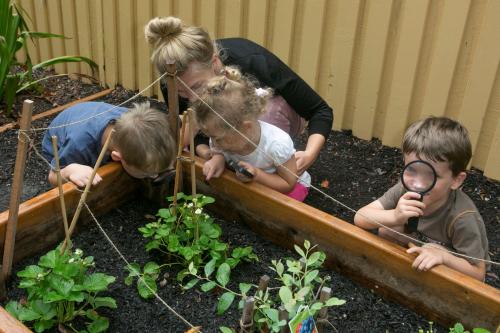Little Scientists: Igniting curious minds

Information overload, virtual reality and other rapid global changes influence our children’s learning and development. Heike Schneider from Little Scientists explains why inquiry-based STEM (Science, Technology, Engineering and Maths) in the Early Childhood Education Sector is so important.
The other day I remembered an incident from when I was a child and my mum insisted that Canada’s capital is Ottawa and not – as I was sure – Montreal. To find out, we had to walk all the way to the library and look it up in the one officially trusted source back in those days, the almighty Encyclopedia.
This flashback in time made me think about how children today have 24/7 access to an almost infinite source of information from various digital sources. It also made me think about what skills children need today to be prepared for future challenges. After some thinking I concluded that in today’s society our children increasingly need:
- Critical thinking and filtering of information: We are flooded with information on a regular basis. How can we make sure that our children can distinguish between trustworthy and misleading information and sources?
- Problem-solving skills: Our society changes faster and faster. Our children need tools to find quick solutions to small and big issues along the way.
- Flexibility and creativity: Our world changes rapidly, requiring the ability to be mentally flexible and creative.
- Concentration and focus: Non-stop distractions like smart phones, iPad, computers and Pokémons makes it more important than ever to be able to prioritise what to focus and concentrate on.
- Cooperation and Co-construction: Modern technology and globalisation create an increasingly connected world that requires advanced communication and social skills, as well as the ability to work in teams and to learn from each other.
Modern education offers many different methods to teach children from an early age the necessary skills to thrive in a more and more complex society and we are seeing an increased interest in inquiry-based learning, where teachers and educators are involved as learning facilitators, but the actual learning is undertaken by the children themselves. One example was recently shared by a teacher in one of our Little Scientists Engineering workshops:
“In summer, the plants in the centre were very thirsty and a few children decided to water them every day. Initially, the children were very excited about this task until they realized that the closest tap was meters away from the plants. What could be done to make the watering more efficient and fun? Over the course of the next few weeks, the children collectively and – more or less – independently developed different ideas and constructed models for carrying devices, water tanks in the garden and a DIY garden hose. After the planning phase, some of the ideas were implemented and one of them – the carrying device – is still used daily!”
In situations like the one described above, children experience different scientific concepts together and are empowered by the process and the outcome. If we do a good job as a society, we create an environment where young children have daily access to these opportunities that amplify their natural curiosity for science, technology, engineering and maths (STEM) in a fun and self-confidence boosting way.
24/7 availability, information overload, virtual reality and other rapid global changes might seem daunting to some of us. However, quality education from a young age with a strong emphasis on inquiry, self-confidence, independent and critical thinking, problem-solving and cooperation can play an important role in taking on future challenges and bring mankind closer together. And, if these little scientists can find a way to efficiently water their plants, I feel confident they will find solutions for much larger problems along the way.
Heike Schneider is Little Scientists Manager Network Partnerships and Training. Little Scientists is an initiative of FROEBEL Australia Limited. The Little Scientists project is supported and funded by the Australian Government Department of Education and Training through the National Innovation and Science Agenda. To learn more about the Little Scientists STEM program for the Early Childhood Education sector, visit www.littlescientists.org.au















Ginounsek
November 9, 2016 at 3:32 pm
wow, awesome
Wow, awesome discussion topic. Thanks Again Really cool.